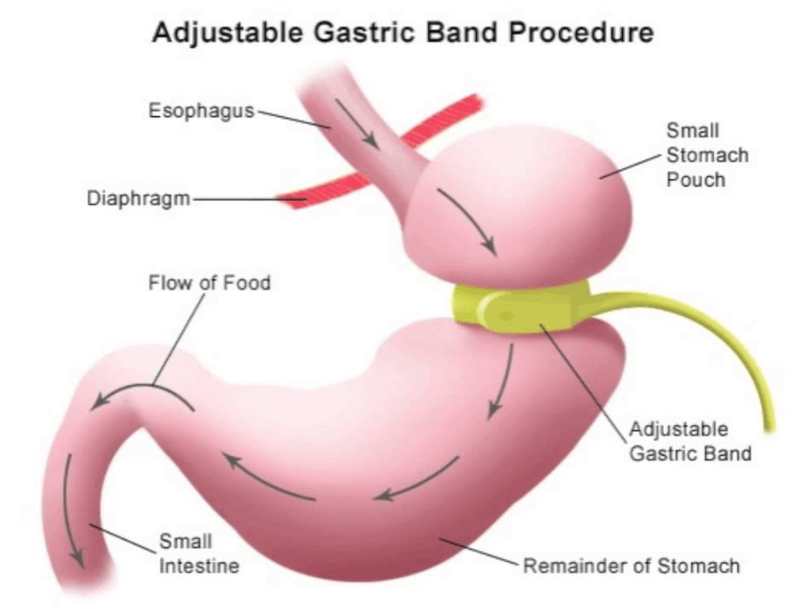What you need to know about Gastric Band Surgery
Contents
A gastric band is a type of bariatric surgery (weight loss surgery) to treat obesity. This procedure involves placing an inflatable silicone band at the upper part of the stomach to reduce the size of your stomach and reduce food intake, so you will feel full after eating less food. Unlike many other types of bariatric surgery, such as Gastric Bypass, this procedure is minimally invasive, quick, reversible, and adjustable.
Your doctor may recommend gastric band surgery for you if your body mass index (BMI) is 30 – 35, non-surgical approaches (such as regular exercise and dietary changes) have not proven effective, and/or you have obesity-related diseases. However, doctors do not recommend this procedure for people who have current alcohol or drug abuse disorder and people who have an uncontrolled psychiatric illness.
After gastric band surgery, you will slowly lose your excess weight and your risk of developing weight-related diseases, such as type 2 diabetes and heart disease, is significantly reduced. You will be able to lead a more active life and enjoy numerous activities you could not do before, such as sports.

What does the Procedure Involve?
Gastric band surgery is carried out under general anesthesia, so you will be asleep during the procedure.
To start the procedure, your surgeon creates several small incisions in your abdomen. These incisions are made to insert a device called a laparoscope, which is a long narrow tube with a camera on its end, as well as small surgical tools. The camera will give clear pictures of your stomach to guide the surgeon. Using the small surgical tools and guided by the camera, your surgeon places an inflatable, silicone band around the top part of your stomach and attaches a tube to the band. The tube can be accessed through a port under the skin of the abdomen. Using the port, saline solution is injected to inflate the band. The saline-filled band divides your stomach into two parts, a small pouch and a large pouch. Food will enter the smaller pouch. Since the smaller pouch can only hold smaller amounts of food, you will feel fuller faster.
How Long Should I Stay in the Area?
It takes around 30 to 60 minutes to complete Gastric Band surgery. The procedure is usually carried out as an outpatient procedure, meaning you can leave the hospital on the same day of the surgery once the effects of the anesthesia wear off. While you can leave the hospital immediately, you should plan to stay in the local area for at least 14 days following your surgery to allow your body to heal and to attend follow-up checkups.
What’s the Recovery Time?
The recovery time after gastric band surgery is relatively short and easier than most other types of bariatric surgery. You should be able to resume your normal activities within 2 days. However, you should wait at least a week until you can go back to work, particularly if your job is physically demanding.
What About Aftercare?
Your surgeon will give you a diet plan for your recovery period. For the first few days following your surgery, your diet is restricted to water and fluids, such as juices, thin soups, and milk. Up until the end of the fourth week, you can eat liquid and blended foods, such as pureed vegetables and yogurt. Soft foods are introduced 4-6 weeks following the surgery. After 6 weeks, you should be able to resume your normal diet.
Besides a diet plan, your surgeon will also provide detailed post-operative instruction. You should take medicines as and when prescribed by your surgeon, use ice packs to deal with inflammation, change your bandage regularly, and avoid lifting heavy objects.
It is also important that you consult a nutritionist who will make sure that your diet consists of food items rich in vitamins and minerals. Following dietary recommendations from your nutritionist and surgeon with care is vital because overeating can lead to dilation of the esophagus and vomiting. You also need to make healthy lifestyle changes to optimize and maintain your weight loss.
What’s the Success Rate?
On average, you should be able to lose 40% to 60% of your excess weight after gastric band surgery. Most people lose about 0.5 kg to 1 kg each week following the surgery. One year after the surgery, you can expect to have lost between 22 kg and 45 kg of your excess weight. In order to accomplish long-term weight loss, you will need to be committed to maintaining a healthier lifestyle, by following a healthy diet and exercise regularly. It is important to bear in mind that gastric band surgery is a tool that will help you lose weight, instead of a shortcut.
Before considering the surgery, you need to be aware of the risks associated with having a gastric band, which may include:
- An adverse reaction to anesthesia, such as breathing problems, blood clots, allergic reactions, infection, heart attack, and stroke.
- Slower weight loss compared to other types of bariatric surgery.
- The band can have mechanical problems, slip, or erode into the stomach.
- Injury to other abdominal organs.
- Hernia.
- Stomach ulcers, gastritis, and heartburn.
- Wound infection.
- Gastrointestinal scarring.
- Poorer nutrition as a result of restricted food intake.

Are there Alternatives to Gastric Band Surgery?
Alternative Bariatric Procedures:
- Gastric Bypass involves creating a small pouch in your stomach and rerouting part of your digestive system so you cannot eat as much as you used to and your body cannot absorb as much food. Gastric bypass is considered as one of the most effective bariatric surgeries.
- Gastric Sleeve works by removing a large portion of your stomach to reduce its size, resulting in a sleeve or banana-like structure.
- Gastric Balloon uses an inflatable balloon to reduce the amount of food your stomach can contain at any one time. The inflatable balloon is temporarily inserted into your stomach through your throat. This procedure is nonsurgical and reversible.
For an in-depth analysis of the pros and cons of Gastric Band surgery, watch this short video.
To check prices or to book a Gastric Band Surgery in Thailand or anywhere else in the world, head on over to MyMediTravel now!

